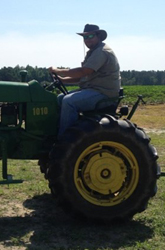
Charlie Cahoon is an Extension Weed Specialist and Assistant Professor at Virginia Tech. His research focuses on developing innovative and sustainable weed management solutions for row crops and vegetables. Additionally, at the forefront of his research are management of herbicide-resistant common ragweed, horseweed, Palmer amaranth, and Italian ryegrass and preemptive measures for avoiding future herbicide resistance. He is also committed to promoting proper stewardship of new herbicide technologies. He received both his BS and PhD from North Carolina State University. His graduate work was conducted under the direction of Drs. Alan York and David Jordan and focused on herbicide-resistant Palmer amaranth management in cotton. In his spare time, Charlie enjoys hunting, fishing, farming, tinkering on his 1962 JD1010 tractor, and traveling with his wife.
Charlie Cahoon is an Extension Weed Specialist and Assistant Professor at Virginia Tech. His research focuses on developing innovative and sustainable weed management solutions for row crops and vegetables. Additionally, at the forefront of his research are management of herbicide-resistant common ragweed, horseweed, Palmer amaranth, and Italian ryegrass and preemptive measures for avoiding future herbicide resistance. He is also committed to promoting proper stewardship of new herbicide technologies. He received both his BS and PhD from North Carolina State University. His graduate work was conducted under the direction of Drs. Alan York and David Jordan and focused on herbicide-resistant Palmer amaranth management in cotton. In his spare time, Charlie enjoys hunting, fishing, farming, tinkering on his 1962 JD1010 tractor, and traveling with his wife.
